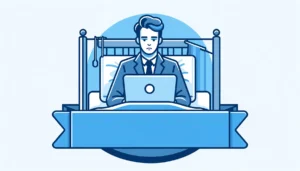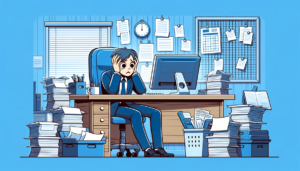The importance of a healthy mind in business
- 5 Min Read
The American Psychiatric Association defines depressive disorder as “a medical illness which affects how you feel, think and behave; causing persistent feelings of sadness and loss of interest in previously enjoyed activities.” Ever felt that way? Most likely we all have at some point or another.
- Author: Leigh A Neal
- Date published: Oct 15, 2018
- Categories

“I have a lot of illnesses. I don’t talk about it much, for a variety of reasons. I feel ashamed to have an illness…I don’t want to use being ill as an excuse…And, to a large extent, I just don’t find it an interesting subject” Aaron Swartz.
 The modern workplace is a highly stressful environment. Almost one in five us are suffering from severe work stress at any one time. Work moves faster than ever before and with the advent of modern technology, our work days are lasting longer and sometimes, not finishing at all. A PWC survey of young people in the workplace found that 73% felt they were required to be contactable at all times. Being able to work from anywhere has come to mean being expected to work everywhere. I’ve had patients describe offices in which time is logged in 6minute increments and work phones are expected to be on up to 18 hours a day.
The modern workplace is a highly stressful environment. Almost one in five us are suffering from severe work stress at any one time. Work moves faster than ever before and with the advent of modern technology, our work days are lasting longer and sometimes, not finishing at all. A PWC survey of young people in the workplace found that 73% felt they were required to be contactable at all times. Being able to work from anywhere has come to mean being expected to work everywhere. I’ve had patients describe offices in which time is logged in 6minute increments and work phones are expected to be on up to 18 hours a day.
But a stressed or anxious brain can cause all kinds of problems for the workplace and for your life in general. Workplace stress is costing the UK, both financially and in terms of our health. According to a 2014 study an estimated 11.3 million workdays a year are lost in the UK to stress and anxiety or depression. That’s costing businesses more than £3.7 billion.
HR managers understand that growing problem of mental illness on their workforce. We’re seeing every growing investment in workplace wellbeing programs. Yoga in the workplace is fairly commonplace these days and the rapid rise in the popularity of ‘mindfulness’ shows the increasing appetite for ways to calm and steady our minds.
People may scoff at these ‘pampered’ new age employees, but studies have found that businesses receive a 200% return on every £1 invested in staff wellbeing. That return usually comes in an increase in efficiency and productivity
Depression and anxiety can seriously affect employees’ ability to do their jobs. As well as decreasing overall productivity, they are also seriously implicated inability to do the job well. Decision-making ability rapidly declines with an increase in depressive feelings, tending to skew towards a more pessimistic perspective that could prevent you from using all of the facts and making the best decision for the business.
Poor mental health can have severe and life-altering side effects that could seep into every area of your life, and every area of your business.
It’s not all bad news though. There are several ways to get started with managing your mental health. The first and most obvious is to take control of your work schedule and hours. It may sound obvious, but taking time away from work could have huge benefits for your mental wellbeing. Look at the parts of your workload that are taking you time and ask yourself whether you could streamline them or hand them over to a colleague. Be tough about it. Don’t hold on to workloads that are consuming your energy.
You don’t necessarily have to go to yoga or take up meditation (although it certainly wouldn’t hurt), but sometimes doing things that you love can help re-set your focus and give your mind a break. Creative pursuits can be particularly helpful.
Many people will find the suggestion almost impossible to follow, but the increasingly popular ‘no tech in the bedroom’ rule is very helpful. One in three of us are waking up and looking at our phone in the middle of the night. Move your charger outside of the bedroom and buy an alarm clock. Not having the option to look at the screen in the early hours can help you to get more sleep and feel better rested for the day ahead.
For more persistent cases of stress or depression there are now a variety of treatments available. If you want to avoid taking long-term medication or time-consuming psychotherapy you could look into Repetitive Transcranial Magnetic Stimulation. This is the treatment I work within my London clinic. It’s clinically proven, NICE approved and it uses magnetic pulses to stimulate the specific areas of the brain associated with mental problems including stress, anxiety, and depression.
For managers and business owners, identifying stressed or depressed employees at an early stage can be crucial to keeping the company on track. Sadly though, diagnosing mental illness isn’t always easy, but there are a few telltale signs. If your colleagues are quick to become irritated or angered, frequently complaining about lack of energy, struggling to concentrate and remember details or finding it hard to make decisions, then they could be suffering from depression. Employees taking an increasing number of sick days, failing to complete their usual duties or behaving strangely in the workplace could also be at risk.
Most importantly, don’t be afraid to talk to your colleagues about mental health and managing stress. Many people will struggle to identify the onset of depression as it occurs, and most of us will put up with extremely high levels of stress before we do anything about it, hence the reason that stress is often referred to as “the silent killer”.
Keeping mental health firmly on the agenda can help workplaces to thrive on both a personal and professional level.









